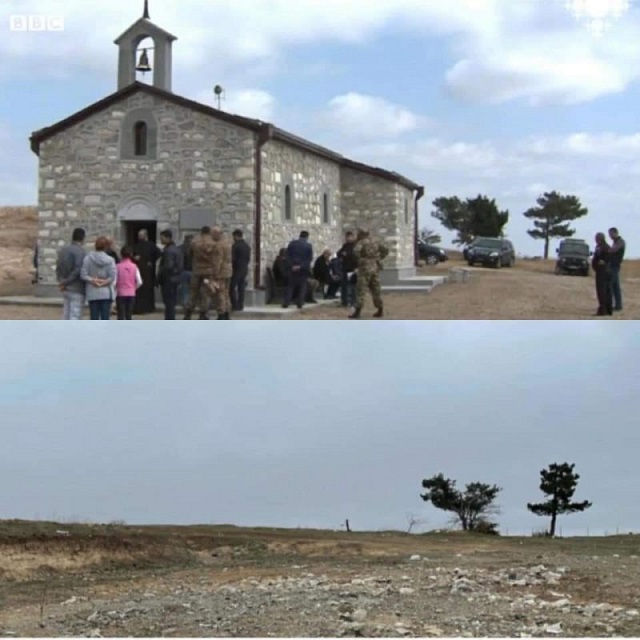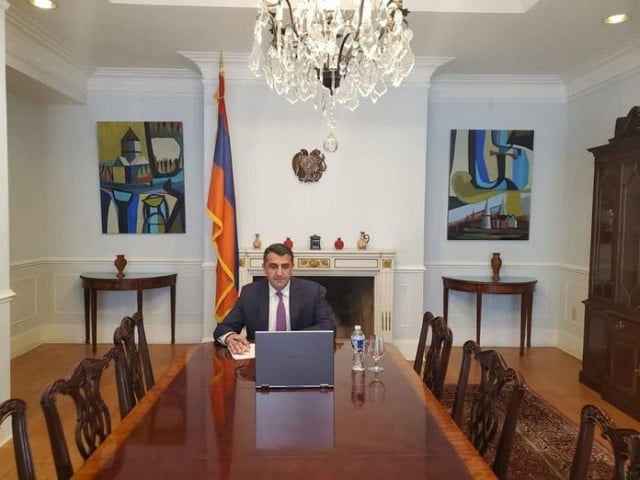Amb. Nersesyan stated that the Armenian side has returned all Azerbaijani prisoners of war, including two convicted murderers, during the first two exchanges of hostages in accordance with its commitment to the November 9, 2020 trilateral Armenian-Azerbaijani-Russian statement on the ceasefire. Azerbaijan has not, however, respected the all-for-all principle. It returned only 75 Armenian captives, but still is keeping an estimated 200 prisoners of war and civilian captives, the ambassador said.
In order to justify this, Nersesyan said that Azerbaijan tried to misrepresent the very nature of the remaining Armenian prisoners of war by invoking a fake “anti-terror operation” and portraying the Armenian prisoners of war as “terrorists.”
More than a month into the ceasefire, Azerbaijani special forces launched an attack in the direction of two villages of the Hadrut region that remained under the Armenian control. As a result of this unprovoked aggression, Azerbaijan captured 64 Armenian servicemen, in violation of its ceasefire obligations under the trilateral statement. Nersesyan said, “They are clearly prisoners of war, falling under the full protection of international law and the Geneva Convention. They are supposed to be treated in a humane manner and returned unconditionally.”
Read also
If Azerbaijan truly wants to restore long-term stability in the region, the first step, he said, is the return of all prisoners of war. However, he said, “The reason why Azerbaijan is not returning them is clear: Azerbaijan keeps them as hostages trying to gain advantage in other matters.”
A second indication that Azerbaijan is not serious about restoring peace, Nersesyan said, are the videos that members of the Azerbaijani military have been releasing. He said, “The Internet is flooded with these extremely disturbing, horrendous videos, in which the Azerbaijani military has been treating Armenian prisoners of war inhumanely, through beatings, torture and even beheadings. These are not members of paramilitary formations who have videoed these acts, but servicemen in the regular chain of command of the Azerbaijani army.”
He noted that while there is some information that Azerbaijan is investigating them, in reality some of the perpetrators have already been awarded by the high-level leadership, which is a clear sigh of encouragement. Maybe this is the reason why the servicemen depicted in the videos are in uniform and do not even feel the need to hide their faces. Instead, they proudly are posting on the Internet. Nersesyan said, “What can one call this if not encouragement by the Azerbaijani government. This is the environment in which we are living.”
A third indication of Azerbaijani attitude is the destruction and desecration by the Azerbaijani military of Armenian cultural and religious monuments. Nersesyan gave the examples of the bombardment of the Sourp Ghazanchetsots or Holy Savior Cathedral in Shushi during the recent war, and its later desecration, as well as the destruction of the St. John the Baptist Church, commonly known as Kanach Zham [Green Chapel] in the same city. The BBC reported on the flattening of the site where the Zoravor Sourp Astvatsatsin Church existed in Mekhakavan (Jebrayil), while Internet images emerged of Azerbaijani soldiers vandalizing the St. Yeghishe Church in Mataghis.

Zoravor Surb Astvatsatsin Church near the town of Mekhakavan, before and after Azerbaijani destruction
Nersesyan said, “All this is nothing but orchestrated by the Azerbaijani government. When it talks about ensuring the rights of the Armenian people in Karabakh, it should be clear that this is how Azerbaijan will behave against the people of Nagorno Karabakh. This is the reason why their fight for freedom and self-determination started in the first place. Nothing has changed over the years in the attitude of Azerbaijan and Turkey toward the Armenian people and their religious and cultural heritage. We see these obvious demonstrations of hatred and the desire to eliminate all traces of Armenian presence.”
He gave as supporting evidence the complete destruction of Armenian khachkars (cross stones) or other Christian monuments in Nakhichevan during peacetime and far from the conflict zone and a reemphasized attempt to try to misrepresent Armenian churches. Nersesyan said, “People who are aware of the history of the South Caucasus would simply laugh when Azerbaijanis attempt to present these churches as anything but Armenian. These churches have a clear Armenian identity supported by inscriptions and features, and are documented in world historiography as such.”
He said that these Azerbaijani actions deserve full condemnation by the international community and immediate action to stop any further attempt at destruction, desecration or distortion of the Armenian heritage in the in the territories that fell under the Azerbaijani military control after the recent aggression. While there have been some statements to this effect by international organizations and structures, he said that so far, there has been no serious attempt by the Azerbaijani government to stop this behavior.
Perhaps the most serious indication that Azerbaijan is not serious about peace, Nersesyan said, is that it is trying to present the conflict as resolved. Nersesyan said, “The core issues of the Nagorno-Karabakh conflict remain unresolved. Amongst them is the right of the people of Artsakh to self-determination which entails the issue of the status and territories of Nagorno-Karabakh which are currently under the Azerbaijani occupation. The conflict can be resolved with a lasting, stable peace only after determination of these issues.”
Consequently, Nersesyan said that Armenia expects and hopes that the Russian, French and American co-chairmen of the Organization for Security and Cooperation in Europe (OSCE) Minsk Group will activate their efforts to find a lasting solution to the issues that have not been addressed by the trilateral statement on ceasefire. Nersesyan observed that US Secretary of State Antony Blinken affirmed at his Senate confirmation hearing that the US would resume its activities within the Minsk Group co-chairmanship. He said that the co-chairmanship “is the only internationally mandated format for the resolution of the conflict….We do not see any alternative and any change in format is unacceptable.”
Apart from this forum, Armenia has initiated interim measures in the Human Rights Court of the Council of Europe concerning the prisoners of war. Armenia is not merely able to defend its stance on NK conflict but also comes up with its own claims in the appropriate time and venue.
Armenian Genocide Factor
With various rumors floating around about the effect of the recognition of the Armenian Genocide by the US president on Armenian foreign policy, Amb. Nersesyan declared unconditionally that the recognition of the Armenian Genocide is a priority for Armenia’s foreign policy. He said, “We very much hope and expect that President Biden on the forthcoming April 24 will call things by their proper names and recognize the Armenian Genocide. The recognition of the Armenian Genocide by the US government can help in any possible future normalization attempt, and we hope and expect that Turkey will reconcile itself with its past before we talk about normalization.”
Nersesyan noted that at this point, there were no processes of such normalization underway. He said, “Turkey has conducted a very aggressive policy towards Armenia and has been directly involved in recent aggression by Azerbaijan which inflicted enormous suffering on the Armenian people.”
The Path Forward
Nersesyan declared that until a full political resolution of the conflict is achieved, there remains a risk of war. He pointed to the territorial claims on Armenia publicly made by Azerbaijan’s president after the end of the war, the references by Turkey’s president to controversial statements of Ottoman leaders, and constant threats to Armenia made by the leaders of these two countries.
He stressed that “Azerbaijan has the false perception that its fait accompli and a temporary military advantage can constitute a solution. This is not a solution but self-deception. If you pretend the issue is resolved, one day it may appear in a completely different perspective.”
Ultimately, he said, the people of Nagorno Karabakh, like any other people around the globe must be able to enjoy basic human rights. He said, “This has been at the cornerstone of the peace proposals by the Minsk Group co-chairs. The right of the Nagorno Karabakh people to self-determination is reflected in numerous statements of the leaders of Russia, France and the United States. No war or aggression can deprive them of this right. It is high time not to pretend that the status issue has been resolved, but to genuinely look to the reality and address it.”






















































